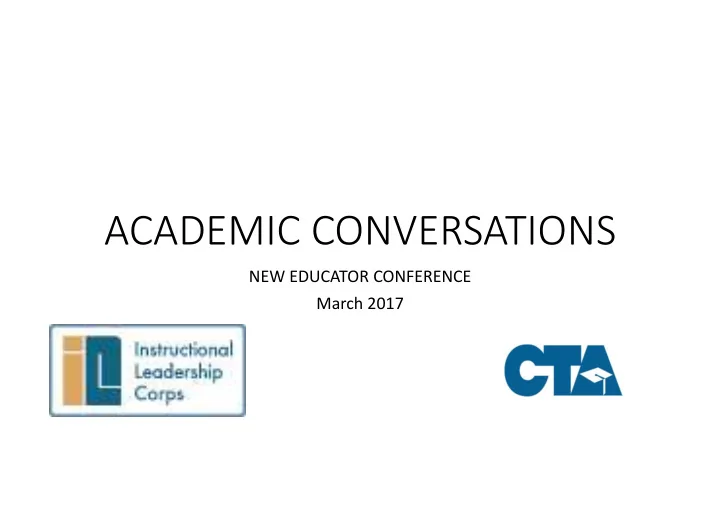

ACADEMIC CONVERSATIONS NEW EDUCATOR CONFERENCE March 2017
Agenda • Welcome & Introduction • Norms • ILC Project • Academic Discussion • Implementation
GROUP NORMS • Be fully present (silence your cell phone) • Share ideas – be open to divergent points of view • Enjoy our time together • Stay in our “Circle of Influence”
Deborah Cress and Jennifer Cordova
Learning Goal Participants will understand the importance of academic discussions to promote critical thinking in the classroom.
Success Criteria • Participants will define academic discussion and understand its purpose. • Participant will be able to implement protocols to promote academic discussion.
Notetaking tool
ACADEMIC CONVERSATIONS Conversations are exchanges between people who are trying to LEARN from one another and build meaning that didn’t have before. Partners take turns talking , listening and responding to each other’s comments. Academic conversations are sustained and purposeful conversations about school topics. Jeff Zwiers & Marie Crawford
Academic Discussion Academic discussions help students process the information they are learning and respond to ideas and questions presented by teachers and other students, giving them deeper understanding of the material they are studying. Jeff Zwiers & Marie Crawford
What is an Academic Discussion? • Purposeful and sustained conversations about content. • Anchored in grade-level texts and tasks. • Students work together to co-construct knowledge and negotiate meaning. • Students use protocols that require every student to talk.
Why Academic Discussions? Helps build.. • Academic vocabulary and grammar • Critical thinking skills such as persuasion, interpretation, consideration of multiple perspectives, evaluation, and application • Literacy skills such as questioning, predicting, connecting to prior knowledge, and summarizing • Complex and abstract essential understanding • An academic classroom environment brimming with respect for other’s ideas, equity of voice, engagement, and mutual support Jeff Zwiers & Marie Crawford
How to make conversations more academic? Cultivate students’ ability to… • elaborate and clarify • support ideas with examples • build on and/or challenge a partner’s ideas • paraphrase • synthesize conversations Jeff Zwiers & Marie Crawford
Protocols • Think-Pair-Share • Inside/Outside Circle • Final word • Fish bowl • Give one, get one, move on • Socratic seminar The Teacher Toolkit
Activity
Teaching Channel video As you watch the video, consider the following: • How does Ms. Groves support English Language Learners? • What are the benefits of using the "Talking Rocks" strategy? • How do students use talk moves in their discussions?
Give One, Get One, Move On (GoGoMo) 1. Write down 3-5 important ideas about academic discussions. Write each idea on a different sticky-note to give away. 2. Get up and mingle. 3. When you hear “GIVE ONE,” form pairs and each “gives” one of his or her important ideas so each person “gives one” and “gets one.” 4. Call out “MOVE ON” and participants mingle again. 5. Form new pairs when you hear “GIVE ONE,” and repeat the process.
Closure • Using yours and “given” ideas on academic discussions, write a summary.
Getting Started ACADEMIC DISCUSSION
Getting Started • Define to students what is a conversation and what is not . “Conversations is a process of bringing your ideas to the table, sharing them, and shaping them as you listen to the ideas of another person. All partners should walk away with new ideas. Rather than winning, the goal is learning.” Jeff Zwiers & Marie Crawford
Getting Started • Teach students acceptable parameters for academic conversations. • Establish discussion norms. • Facilitate a discussion around the following questions: • How you can tell if someone is or is not listening to you? • How does it feel when someone interrupts you while you are speaking? • What happens when one persona dominates a conversation? • How can we respectfully disagree with another’s opinion? • Reinforce discussion norms by assessing them often. Jeff Zwiers & Marie Crawford
Productive Partners Use the 4 Ls: • L ook at your partner. • L ean toward your partner. • L ower your voice. • L isten attentively. Kinsella
Getting Started When assessing the adherence to the discussion, use the following checklist: Are students… • staying focused on the topic? • are students building on another’s idea? • supporting ideas with examples or evidence? • respectfully negotiating an idea when in disagreement? • maintaining eye contact and using good conversational body language? • choosing the most academic ways to talking? Jeff Zwiers & Marie Crawford
Socratic Seminar The “Super Bowl” of Academic Discussion
Protocols ACADEMIC DISCUSSION
Protocols resources • Expeditionary Learning https://www.engageny.org/sites/default/files/resource/attachments/appendix_ protocols_and_resources.pdf • Discussion protocols from Edutopia https://www.edutopia.org/pdfs/stw/edutopia-stw-assessment-discussion- protocols-for-any-subject.pdf • National School Reform Faculty http://www.nsrfharmony.org/free-resources/protocols/a-z
Academic Discussion • Implementation of Strategy • Protocol
Follow up Via email, we will contact you in about 2 weeks with follow up questions regarding implementation of this strategy.
Reflection
Reflection header • Session One • Presenters Deborah O Cress & Jennifer Cordova
Recommend
More recommend